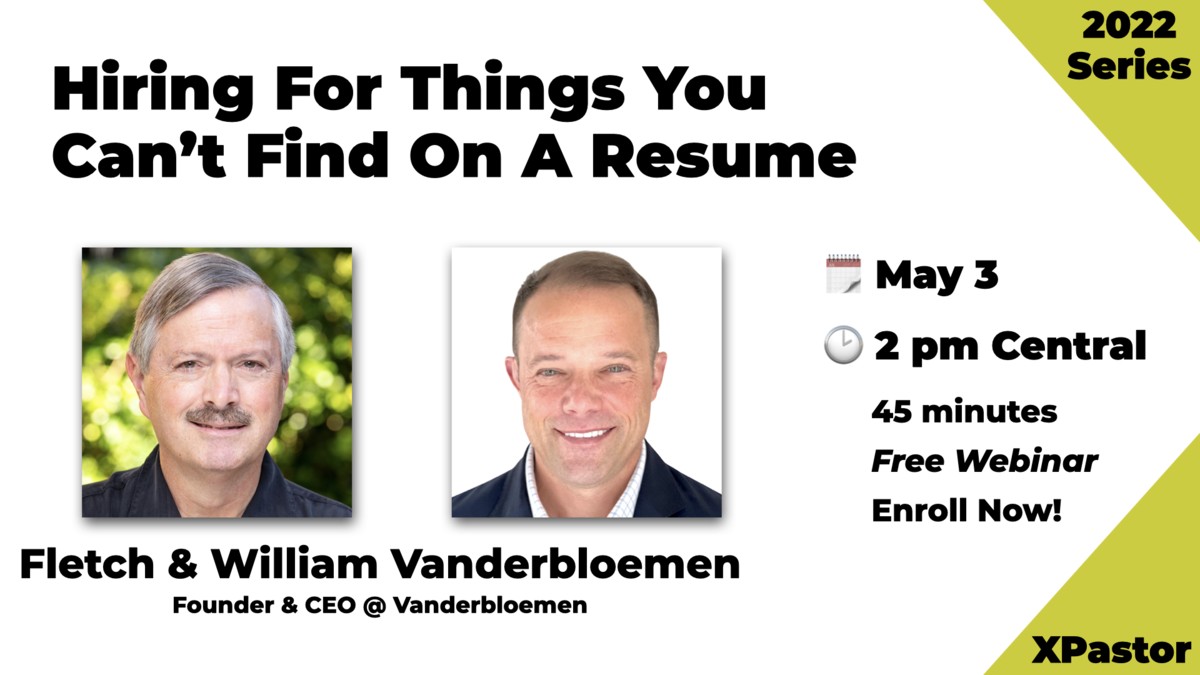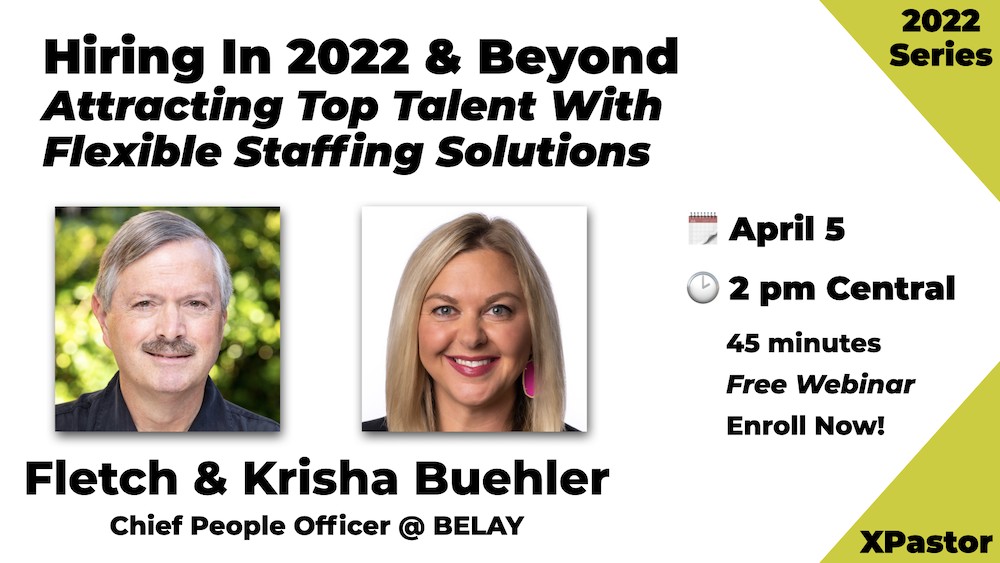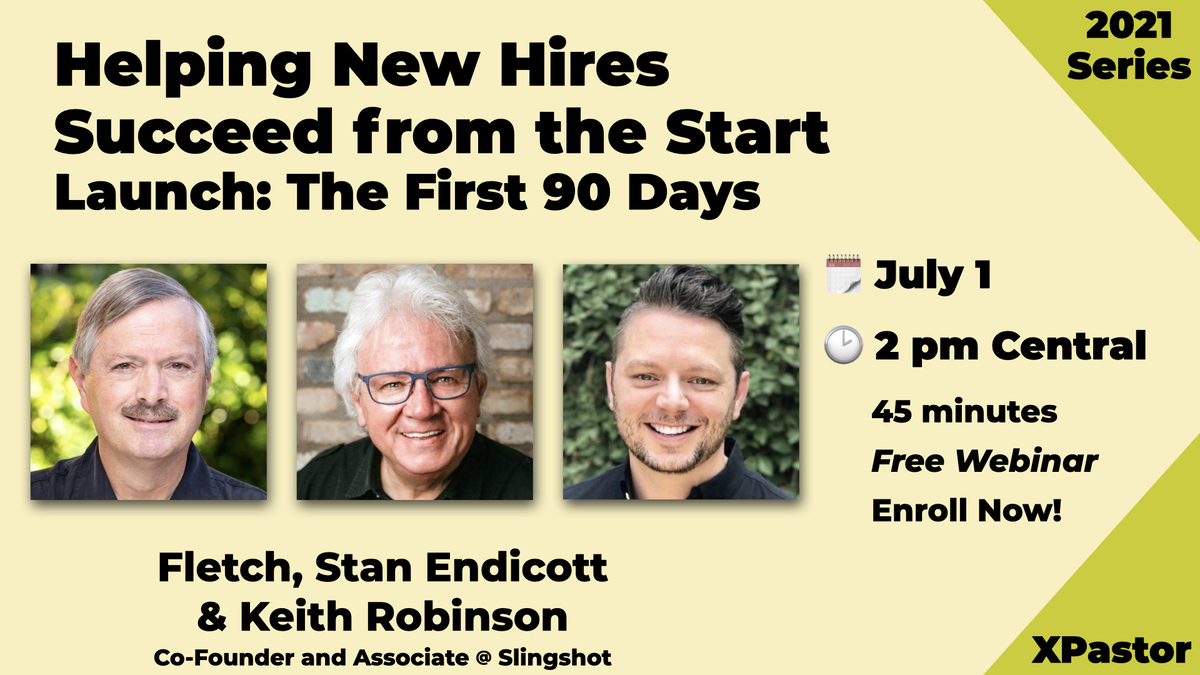A couple of months ago, I was asked to give a presentation entitled, “Executive Pastor: If, When, Why, How?” As you can guess from the title, the focus was on churches that were thinking about creating this role. It was fun to pull my thoughts together and interact with a group of Senior Pastors who were looking for perspective on these questions.So what did I say?
Let me start with three bad reasons to create an XP position:
1. I don’t like people.
Some Senior Pastors seek to be insulated from the staff and church members. It’s true that people can drain huge quantities of time that a Senior Pastor needs to spend on other matters, and an Executive Pastor can be helpful in shouldering some of this load. But a Senior Pastor should never be detached and out-of-touch with the congregation. After all, we’re in the people business.
2. I don’t like administration.
Just like the first reason above, there is an element of legitimacy in this. Any pastor who wants to find more hours in the day should be looking for ways to delegate administrative tasks to someone else. But if this is the only reason for hiring an Executive Pastor, then you are really looking to hire an Office Manager, Business Manager, or Church Administrator, not an XP.
3. Everyone else is doing it.
This is the worst reason of all. If your motivation is to keep up with the church down the street or simply because you heard another pastor raving about the benefits of having an XP, you are setting yourself up for disaster. An Executive Pastor role must be crafted to fit your personality and the needs of the church. If you are simply a copycat, then you have not identified those unique needs.
Perhaps you’re not guilty of any of the wrong reasons, but you’re not sure if your next staff position should be an Executive Pastor. After all, the role comes with a significant financial commitment. How do you decide whether to spend that money on functional positions (e.g., youth, technology, support staff, etc.)?
Some of the right reasons for creating an XP position are:
1. The leadership burden has gotten too big.
There’s just not enough of you to go around. As a result, you don’t ever feel that you’re able to spend the time that’s needed on major decisions or casting vision or preparing sermons or investing in your family. You can sense that the church is struggling because of this lack of clear leadership.
2. Staff and church members see the need.
It may be that others see the need for an XP before you do. They are concerned that you’re close to burn-out or that you’ve become the limiting factor in the church’s ability to take more ground for the Kingdom. If a staff member says that he or she would rather report to an Executive Pastor than the Senior Pastor because an XP would have time for them, pay attention!
3. You’re ready to let go.
Even if the first two reasons are true, you have to be willing to hand-off some of your responsibilities or you won’t realize the benefits of hiring an XP. Don’t overlook this reason—the “failure” of many second chair leaders can be traced to a first chair who wasn’t ready to share the reins of leadership.
4. Supervising others is not your strength.
Don’t confuse this “good reason” with the “bad reason” of not liking people. Many Senior Pastors struggle with supervision. They don’t have time to do it well, aren’t skilled at developing people, and/or don’t know how to give meaningful feedback (positive or negative). If the staff acts more like “free agents” or contractors than team members and if you are not happy with their performance, then an XP may be part of the solution.
5. Big vision but little implementation.
Many visionary pastors wonder why the church isn’t making more progress toward their vision. The reason is that no one has been able to translate the vision into concrete steps that can be implemented. Some of the best first-second chair combinations occur when a gifted and trusted XP comes alongside the Senior Pastor, is able to understand the vision at a deep level, and then brings it to life by fleshing out the details and getting people moving.
This is not an exhaustive list, but it covers the most important reasons for creating an Executive Pastor position across a wide variety of churches.
Let’s assume your decision to hire an Executive Pastor is based on the right reasons. You’ve conducted a thorough, prayerful search and have just brought a great person on board in the role. Now what? What are the keys to success as you launch this new position?
Clearly define the role
Have you created a written job description? In my experience, job descriptions for Executive Pastors are only a starting point, but they are still important. The new XP needs to understand what is expected of him or her. Beyond the job description, the Senior Pastor needs to be prepared to spend at least the first year providing clarification. For example, if the XP is to “run the staff meetings,” will the Senior Pastor still attend the meetings? Does the XP set the agenda? If so, does the Senior Pastor need to review it first? If not, how should the Senior Pastor be involved with the staff?
Leverage complementary gifts
You don’t need an XP who is just like you. You need someone who is different, whose strengths and gifts line up with the areas where you struggle. But this means that you have to recognize and deal with three challenges. First, you have to be willing to admit your weaknesses. Second, you have to allow someone to be better than you in those areas (without getting defensive or jealous or feeling insecure). And finally, you must realize that differences in abilities and perspectives will create moments of conflict.
Create a true partnership
The best Senior-Executive Pastor pairs are partnerships. Think of Paul and Timothy. A defining characteristic is that the Senior Pastor wouldn’t hesitate to have the XP represent him in a key conversation or meeting. This is only possible if the trust level is very high between them. And high trust only comes when they intentionally spend time together and invest in each other’s lives.
Be patient
Don’t expect dramatic results instantly. When you’re wondering if the new XP will ever get up the learning curve or reach his or her full potential, remember that great partnerships aren’t created overnight. And when you butt heads because of personality differences, remember that those difference will make you and the church stronger. It takes several years for an Executive Pastor to hit his or her full stride.
Close the back door
The first time that a church hires an XP, everyone else on the staff takes a “step down.” Rather than reporting to the Senior Pastor, they now report to the second chair. Some staff members won’t like this and will test the system by going directly to the Senior Pastor for advice or approval. If you allow this to happen, you will greatly diminish the XP’s role. It’s better to be unavailable or to listen politely and then redirect them to the Executive Pastor without making a decision.
Share the vision
For the XP to be the “go to” person for implementing the vision, he or she must fully understand and support it. In the best partnerships, Senior and Executive Pastors dream together. It’s not just the Senior Pastor’s vision; it’s theirs together. This takes time, but great power is unleashed by a vision that is truly shared.
One final thought: make a point to have periodic check-up visits during your new XP’s first twelve to eighteen months and ask for their perspective on how things are going. Easy? Not at all. But investing in these key factors will pay great dividends for you and your church over the long haul.











